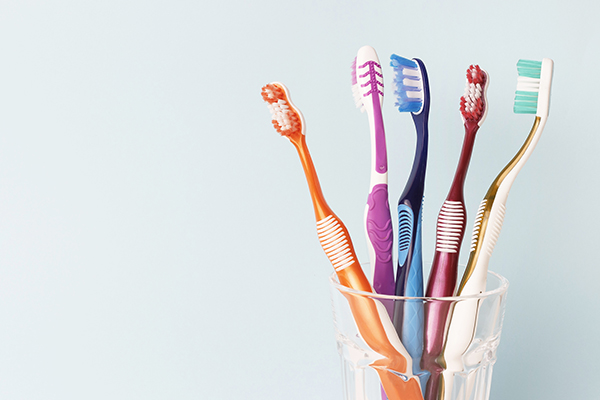7 Simple Habits to Keep Your Teeth Healthy

Taking care of your teeth and gums is one of the most important things you can do for your overall health.
Healthy teeth serve as a gateway to the rest of your body, impacting your heart, lungs, bones, and more.
Yet when it comes to prioritizing health and wellness habits, our teeth can often take a backseat.
Be honest: Do you think about your teeth other than when you brush them? Do you floss regularly? Do you postpone making dental appointments?
In order to make (and keep) dental health a priority in your life, here are seven self-care habits that can help maintain healthy teeth and gums.

1. Brushing Regularly
The best habit for healthy teeth is brushing them regularly.
“This will manage the bacterial load in your mouth, which, if unmanaged, can affect other aspects of your health, such as cardiovascular function,” explains Lilya Horowitz, D.D.S., F.A.G.D., of Domino Dental.
And don’t rush when you brush.
The American Dental Association recommends brushing for two minutes twice a day, so set a timer and be patient.

2. Choosing the Right Toothbrush
Make sure you’re brushing with the right toothbrush to keep healthy teeth and gums happy.
Horowitz recommends a soft toothbrush that “does not irritate the gums or enamel, but should also be able to remove surface stains to keep your teeth bright,” she says.
Even with soft bristles, don’t brush too hard, which can irritate your gums or damage tooth enamel over time.
“Healthy, pink gums are not inflamed nor should they bleed,” Horowitz says.
And be sure to replace your brush every three to four months, or when the bristles are starting to show wear.
An electric toothbrush can prevent you from brushing too hard, but a manual one is fine, too.
3. Flossing Daily
If you think floss is mostly for removing pesky bits of food from in between your teeth, think again.
Flossing daily plays a bigger role in maintaining healthy teeth and gums.
“Flossing removes plaque and bacteria from below the gum line and also introduces oxygen into the area,” Horowitz says. “Many types of bacteria that cause gum disease are anaerobic, meaning they don’t thrive when introduced to oxygen.”
Flossing regularly can also help improve your breath by removing the bacteria that cause it to smell foul!

4. Drinking Plenty of Water
Need another reason to drink more water during the day? Staying hydrated can help keep your teeth healthy.
“Water helps remove plaque and food debris from teeth,” Horowitz explains.
“This maintains a more alkaline oral environment after eating and drinking.”
That shift in pH matters because it’s the acid produced by bacteria (as they chow down on sugars and other food debris on your teeth) that causes cavities and decay.
5. Eating a Healthy Diet
“What you eat can have a significant impact on your oral health,” says Shannon Henry, R.D., of EZCare Medical Clinic.
Ditch the sugary snacks and drinks (and processed, starchy foods) and replace them with whole foods, including plenty of fruit and vegetables.
Essential nutrients like vitamin D, calcium, magnesium, and phosphorus play important roles in maintaining strong bones and healthy teeth, so make sure you’re eating a well-balanced diet.
6. Quitting Smoking (and Vaping)
For healthy teeth and gums, put down the cigarettes and vape pens.
“Smoking constricts blood vessels and prevents correct distribution of oxygen,” Horowitz says, “which is a risk factor for gum disease and premature tooth loss.”
Smoking raises your risk of gum disease and infections (since it weakens your immune system) — and it can cause unsightly stains and discoloration, too.
7. Chewing Gum When You Can’t Brush
When you can’t brush or are craving something sweet, it’s perfectly fine to reach for sugar-free gum, says Henry.
“Sugar-free chewing gum increases the salivary flow in your mouth,” she says. “Saliva can wash away food, neutralizes acid in the mouth, and can repair damaged teeth.”
Look for gum sweetened with xylitol, a naturally occurring sugar alcohol, that shows promise in preventing cavities and supporting healthy teeth.
